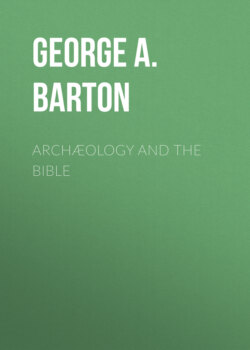Читать книгу Archæology and the Bible - George A. Barton - Страница 12
На сайте Литреса книга снята с продажи.
Оглавление(8) The Greek and Parthian Periods.—Alexander the Great overthrew Darius III, the last of the Persian kings, in 331 B. C., when Assyria and Babylonia passed under the sway of the Macedonian. When Alexander returned from his conquest of hither India in 325 B. C., he planned to extend his empire westward to the Atlantic Ocean, and to make Babylon its capital. Plans for the enlargement and beautifying of the city, so as to make it a worthy capital for such an empire, were under way when Alexander suddenly died in June, 323 B. C. In the final division of the world among Alexander’s successors, Babylonia fell to Seleucus, together with all the territory from the Mediterranean to the borders of India. As Seleucus desired a capital on the Mediterranean, so as to watch more successfully the movements of his rivals, he built Antioch on the Orontes and made it his residence. Babylon was, however, made the capital of the eastern half of the empire, and the king’s son, as viceroy, made it his residence.
Soon after 260 B. C. Bactria and Parthia, in the eastern part of the empire of the Seleucidæ, gained their independence. In course of time Parthia absorbed Bactria and became an empire, which lasted till 230 A. D. About 150 B. C. the Parthians conquered Babylonia, which remained with little interruption under their sway till the establishment of the Sassanian kingdom of the Persians in 220 A. D. Babylonia was under the control of this last dynasty until the coming of the Mohammedans in the year 637 A. D. The old culture of the Babylonians, their religion, language, and writing were maintained well down toward the Christian era. Copies of old Sumerian hymns have been found in Babylonia which bear dates as late as 81 B. C., and business documents in Semitic are numerous.[17]
7. Discoveries Which Illumine the Bible.—Discoveries in Babylonia and Assyria which illumine the Biblical narratives are numerous. The sites of many cities, such as Ur of the Chaldees, Erech, Babylon, Ashur, Nineveh, and Calah, have been excavated. The number of documents which have come to light which in one way or another have a bearing on the Bible is too numerous to mention here. An effort has been made in Part II to translate examples of most of them. Indeed, the greater part of the material in Part II was recovered by excavations in these countries.
To Babylonia and to Egypt mankind owes the working out of the initial problems of civilization, the processes of agriculture, the making of bricks, the working of stone, the manufacture and use of the ordinary implements of life, the development of elementary mathematics and astronomy, etc. These problems were by slow processes independently worked out in each country through long ages. The higher spiritual concepts which have now become the heritage of man neither Babylonia nor Egypt was fitted to contribute. These came through the agency of other peoples.
